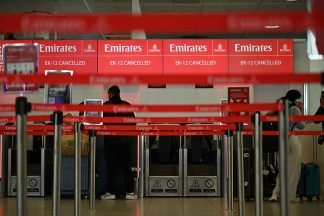Banking giant UBS is buying its smaller rival Credit Suisse in an effort to avoid further market-shaking turmoil in global banking, Swiss president Alain Berset announced on Sunday night.
Swiss president Alain Berset, who did not specify a value of the deal, called the announcement “one of great breadth for the stability of international finance. An uncontrolled collapse of Credit Suisse would lead to incalculable consequences for the country and the international financial system.”
Credit Suisse is designated by the Financial Stability Board, an international body that monitors the global financial system, as one of the world’s globally systemic important banks.
This means regulators believe its uncontrolled failure would lead to ripples throughout the financial system not unlike the collapse of Lehman Brothers 15 years ago.
Sunday’s news conference follows the collapse of two large US banks last week that spurred a frantic, broad response from the US government to prevent any further bank panics.
Still, global financial markets have been on edge since Credit Suisse’s share price began plummeting this week.
The 167-year-old Credit Suisse had already received a 54 billion Swiss francs loan (£47bn) from the Swiss National Bank, which briefly caused a rally in the bank’s stock price. Yet the move did not appear to be enough to stem an outflow of deposits, according to news reports.
Still, many of Credit Suisse’s problems are unique and do not overlap with the weaknesses that brought down Silicon Valley Bank and Signature Bank, whose failures led to a significant rescue effort by the Federal Deposit Insurance Corporation and the Federal Reserve.
As a result, their downfall does not necessarily signal the start of a financial crisis similar to what occurred in 2008.
The deal caps a highly volatile week for Credit Suisse, most notably on Wednesday when its shares plunged to a record low after its largest investor, the Saudi National Bank, said it would not invest any more money into the bank to avoid tripping regulations that would kick in if its stake rose about 10%.
On Friday, shares dropped 8% to close at 1.86 francs (£1.65) on the Swiss exchange. The stock has seen a long downward slide: It traded at more than 80 francs in 2007.
Its current troubles began after Credit Suisse reported on Tuesday that managers had identified “material weaknesses” in the bank’s internal controls on financial reporting as of the end of last year. That fanned fears that Credit Suisse would be the next domino to fall.
While smaller than its Swiss rival UBS, Credit Suisse still wields considerable influence, with 1.4 trillion US dollars (£1 trillion) in assets under management.
The firm has significant trading desks around the world, caters to the rich and wealthy through its wealth management business, and is a major advisor for global companies in mergers and acquisitions. Notably, Credit Suisse did not need government assistance in 2008 during the financial crisis, while UBS did.
Despite the banking turmoil, the European Central Bank on Thursday approved a large, half-percentage point increase in interest rates to try to curb stubbornly high inflation, saying Europe’s banking sector is “resilient”, with strong finances.
ECB President Christine Lagarde said the banks “are in a completely different position from 2008” during the financial crisis, partly because of stricter government regulation.
The Swiss bank has been pushing to raise money from investors and roll out a new strategy to overcome an array of troubles, including bad bets on hedge funds, repeated shake-ups of its top management and a spying scandal involving UBS.
Follow STV News on WhatsApp
Scan the QR code on your mobile device for all the latest news from around the country


 PA Media
PA Media
























